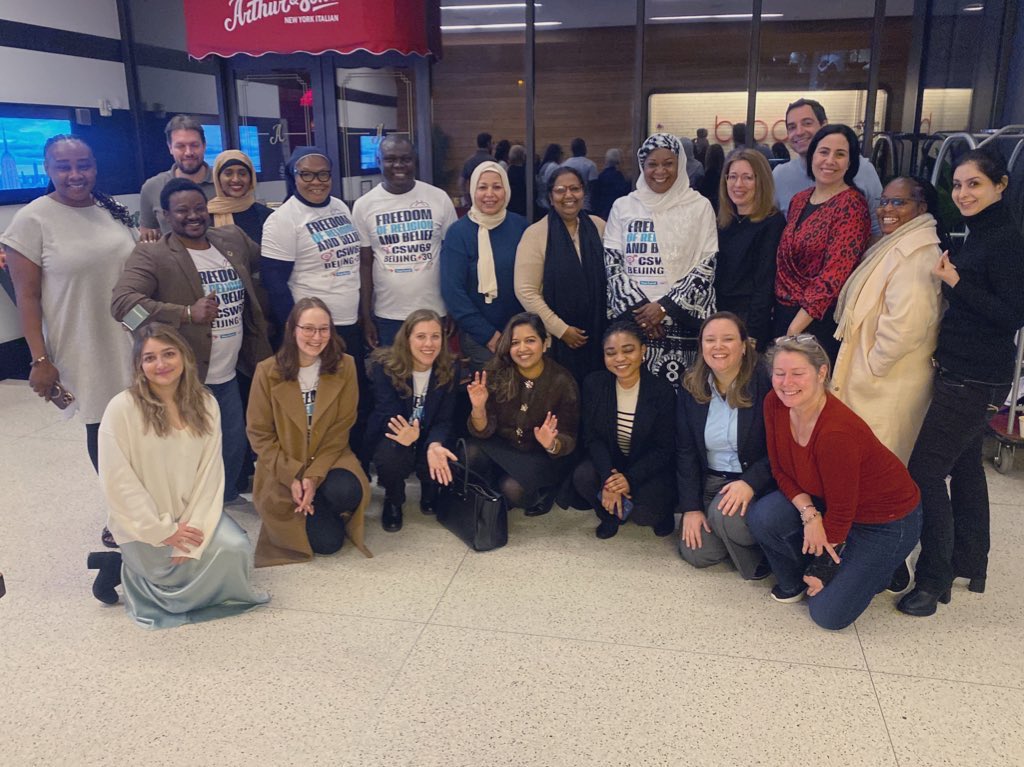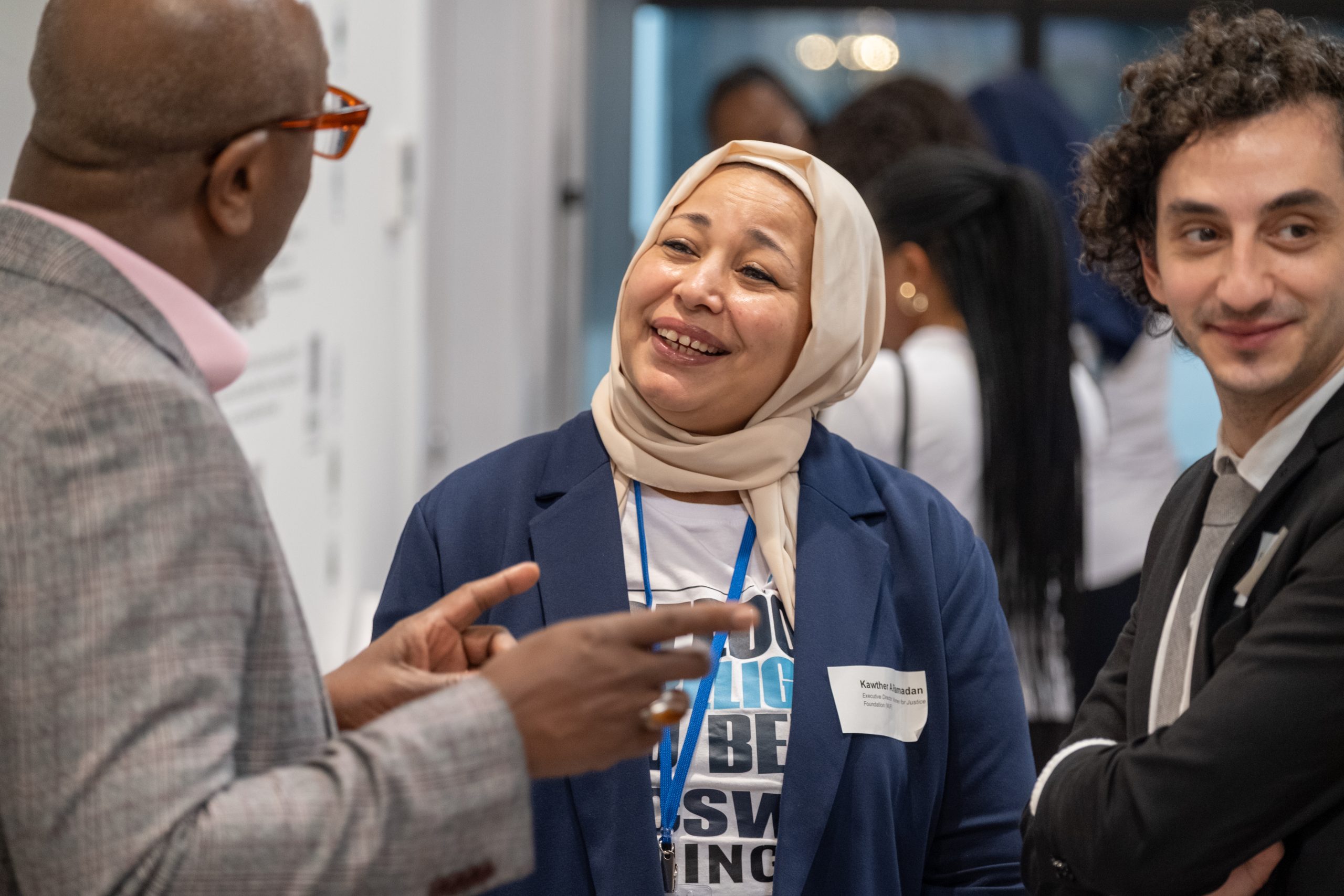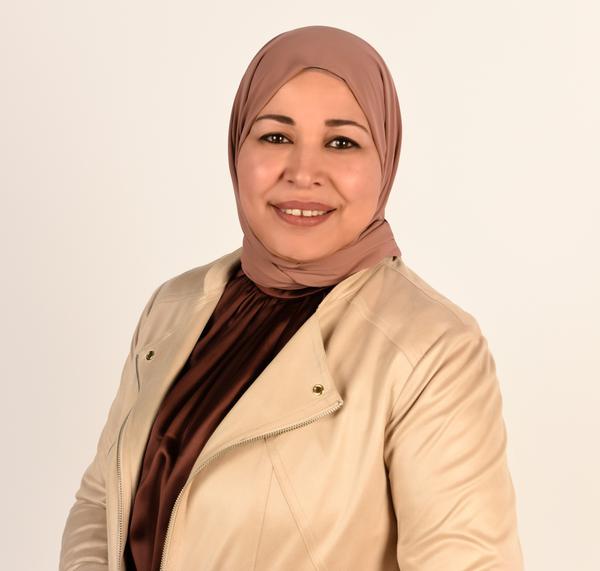Blog
From Inclusion to Influence: Centering Women of Faith in Global Policy
A reflective piece by Kawther Ramadan Executive Director of the Women for Justice Foundation, on the ‘Joint Initiative for Strategic Religious Action’ (JISRA) Project Mission to the 69th Commission on the Status of Women in New York City.

The JISRA Women of Faith Mission at CSW69 – united in advocacy for gender equality, peacebuilding and Freedom of Religion or Belief. March 2025.
For decades, global advocacy efforts have emphasized the importance of women’s meaningful participation in shaping policies that affect their lives. Yet even today, women and young women of faith—particularly from the Global South—continue to be sidelined in international policymaking spaces. My experience at CSW69 made one thing clear: showing up is no longer enough. What’s needed now is recognition, participation, and real influence.
Attending the 69th Commission on the Status of Women (CSW69) in New York City wasn’t just another global gathering—it was a powerful reminder of how urgent and necessary our collective advocacy has become. As part of the JISRA Women of Faith Mission, I joined 15 inspiring people of faith from 10 countries to advocate for gender equality, peacebuilding, and freedom of religion or belief (FoRB).
From March 10 to 14, I participated in a range of events alongside the JISRA consortium led by the Peacemakers Network, Tearfund, Faith to Action Network, and Mensen met een Missie. From high-level panels to intimate, heartfelt conversations, the week reaffirmed my belief in policy and advocacy rooted in lived experience. Whether at the Roundtable on Women of Faith Advancing the 12 Critical Areas of the Beijing Declaration hosted by the Bahá’í International Community, the multifaith reception held by the Buddhist Tzu Chi Foundation, or, or the panel Faith, Empowerment, and Equality: A Conversation with Women and Young Women of Faith, I witnessed the transformative power of intersectional leadership—especially when it’s led by women of faith.

Kawther Alkholy speaking with representatives of the Tanenbaum Center for Interreligious Understanding at the UN CSW High-Level Multi-Faith Reception. March 2025.
One of the biggest takeaways from the week?
Advocacy must go further than representation. Visibility is a start, but it’s not the finish line. Women and young women of faith, particularly from the Global South, hold essential knowledge and insights that should be shaping global frameworks. Yet far too often, our contributions are treated as optional, rather than central.
So what does meaningful inclusion really look like? It means shifting from symbolic gestures to structural change. That requires action across several key areas:
One critical step is to institutionalize inclusion by mandating gender-and faith-inclusive consultations in policymaking, particularly in national strategies related to FoRB and gender. This also means ensuring intersectional representation on advisory councils and committees that reflect the diversity of women’s experiences across faiths and ethnicities. Policies should not be siloed—FoRB must be integrated into Gender Equality Action Plans, and gender should be fully embedded into FoRB strategies.
Another vital area is the need to support Faith-Based Women’s Organizations (FBWOs), especially those working at the grassroots level. These organizations are already doing the work—providing care, mediating conflicts, and advocating for justice in their communities—often with very limited resources. Donors and governments must go beyond viewing these groups as implementers and instead provide them with direct, flexible, and long-term funding as equal partners in development, peacebuilding, and advocacy work. Their exclusion from high-level forums must end.
Inclusion also means creating spaces where young women of faith can speak freely and safely. Interfaith and intergenerational dialogues are essential for fostering understanding, solidarity, and shared vision. These spaces must be supported by psychosocial and community networks, particularly for those navigating religious or patriarchal pushback. One possible initiative would be to fund regional “Faith and Freedom Dialogues,” designed specifically to elevate young women as facilitators, storytellers, and leaders in their own right.
Religious leaders, both male and female, must also be engaged as allies. This includes training faith leaders in gender justice and FoRB frameworks so they can shift from gatekeeping to genuine allyship. Collaborative efforts between scholars, activists, and faith leaders can promote gender-equitable interpretations of religious texts, transforming deeply rooted narratives. In Indonesia, for example, women-led faith coalitions helped reduce gender-based violence by reframing religious narratives—a powerful example of how change is possible when theology and justice align.
Amplifying the voices of women of faith in global advocacy spaces is equally important. Too often, we are invited to attend international summits but not to speak or lead. That must change. Women of faith should be featured as speakers, experts, and strategists—not just as symbolic presences. Media and digital platforms also play a crucial role in reshaping public discourse and highlighting the leadership of religious women, whose stories are often overlooked.
Legal protections are also essential. Discriminatory laws—such as those governing inheritance, marriage, or dress—disproportionately impact women of faith. Reforms must be pursued both locally and internationally to ensure that women’s rights are upheld alongside their right to religious freedom. There also needs to be a reliable mechanism for reporting and responding to violations of both FoRB and gender rights, making accountability an integral part of any framework.
Finally, none of this work can be sustained without better data and deeper research. Disaggregated data that includes gender, age, and religious affiliation is critical for designing effective, responsive policies. We also need more qualitative research that centers the lived experiences of women and girls at the intersection of gender and faith. Their stories, struggles, and solutions must inform the next generation of policy design.
Thoughts Moving Forward
Underlying all these actions are a few guiding principles. We must embrace intersectionality, recognizing the complexity of multiple identities—gender, religion, ethnicity, age, disability and social class. We must prioritize localization, ensuring that local actors lead and shape the agenda. And we must practice co-creation, designing policies with women of faith, not just for them.
Women of faith are not merely participants in global conversations—we are leaders, peacebuilders, and advocates for justice. Our presence must translate into power, our stories into strategy, and our visions into policy. The time for passive inclusion has passed. Now is the time for meaningful, transformative influence.

About Kawther Ramadan
Kawther Ramadan is the Executive Director of the Women for Justice Foundation and a PhD candidate in Social Innovation at Saint Paul University in Ottawa, Canada. Her work integrates policy advocacy, research, and storytelling to amplify the voices of women and marginalized communities around the world.
An expert on transnational movements and the intersection of women’s rights and religion, Kawther focuses on empowering women’s agency and challenging patriarchy, particularly within Muslim contexts. She is also deeply committed to addressing Islamophobia in the Global North, working to foster understanding and dismantle prejudice through her work.
For more blogs and insights, visit her website: https://www.kawtheralkholy.net
Follow the Peacemakers Network on social
